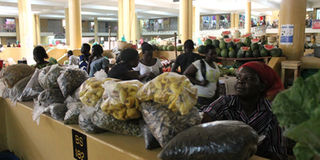Preserving vegetables for drought season

A woman sells some of the preserved vegetables at Gulu Main Market. Photo by Stephen Okello.
What you need to know:
- The effects of the long-drought spell in Uganda can still be felt.
- But for some farmers in northern Uganda, it was a good time to sell some of their preserved vegetables, writes Alice Adikin
Not all is gloom with the prolonged drought that has plagued the country. The drought has taught many farmers to get creative and preserve foodstuffs for similar occurrences. Some of the foodstuffs being preserved include tomatoes, onions, cabbages, eggplant, and other vegetables whose price had increased due to scarcity on the market.
Hellen Apiyo, a vegetable vendor in Gulu Municipality says she never runs out of stock for vegetables to supply her clients and home because she plans ahead of the seasons. Apiyo says preservation of vegetables is one sure way to ensure that a family has a rich diet especially in times of scarcity. She says all these preserved vegetables can be served with millet bread, sweet potatoes and cassava.
Cucumber
Apiyo says northern Uganda has a local cucumber locally known as obokokwe. It also serves as a fruit when it is still fresh.
She said cucumber is one of the vegetables that can be dried and consumed during drought season. To dry cucumber one has to open the fruit and remove all the seed, divide the fruit into two pieces, wash, before spreading it under the sunshine to dry. It can take two to four days to dry depending on the heat intensity.
The dry cucumber is yellow in colour and looks like local yellow passion fruit cover.
“When preparing dried cucumber, first split it into small pieces and boil it with bicarbonate, onion and tomatoes until it gets ready. You can either fry like any other sauce or mix with meat, silver fish or groundnut paste depending on person’s preference,” Apiyo explained. If retailed, the cucumber can be sold at Shs500 a bunch.
Okra
Apiyo says okra is chopped into small pieces and spread under the sun to dry then kept and prepared and served as vegetable during dry season.
She says these vegetables are recommended for people with constipation. The prices for this vegetable vary depending on size as Aber explains. A small bundle is Shs500 at Gulu Main Market.
Boo (pea leaves)
Boo is the mostly consumed vegetable by the people from north and eastern Uganda.
Apiyo says the pea leaves are first boiled with little salt as preservative before being spread to dry under the sunshine. When it’s dry it can either be turned into powder form that is added into groundnut sauce or sim-sim stew to thicken the soup. Aber says preserved boo starts from Shs200 a bunch.
Malakwang
It is a green finger like vegetable. Before drying it, Apiyo says, it has to be well sorted because it has hard veins that take long to dry. Apiyo says they charge Shs200 per bundle for this vegetable.
Egg plants
It should be chopped into small pieces and spread under the sunshine to dry. This can take three to four days to dry. Sun-dried egg plants taste the same as the fresh ones. It can be served with groundnut paste, sim-sim paste or fried with onions and tomatoes and mixed with silver fish.
According to Polly Aber, a vegetable vendor at Gulu Main Market, this delicacy is at Shs500, per bundle.
Other preserved foods
There are a number of foodstuffs that are preserved and these include;
Sweet potatoes
Sweet potatoes are another dish that is preserved and stored for the drought season. It is sliced in small pieces washed with clean water to remove soil and sand and then spread under the sunshine to dry thoroughly so that it does not ferment. It has to be properly stored to protect it from weevils and coldness. In the past, dried sweet potatoes were strictly for home use but currently it is being sold as crisps and powder. The price varies depending on where it is bought.
Simsim
Simsim can either be ground, dried or roasted. It can be ground to extract oil. Apiyo says in Acholi simsim is known as Lakotokoto. The price of sim-sim ranges between Shs3,000 and Shs4,000 at Gulu main market. However, in other places, the price ranges from Shs2,000 and Shs2,500 per kilogramme.




